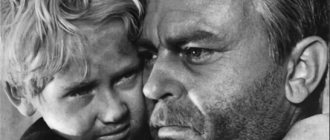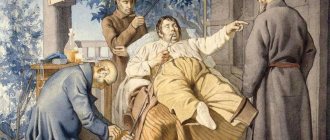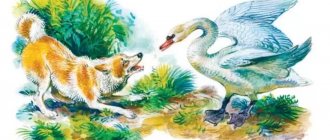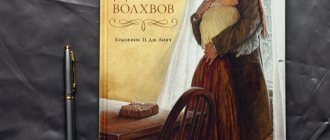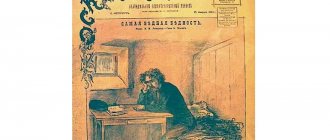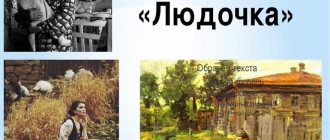War is one of the most terrible events that can happen in people's lives. It has enormous destructive power, making you forget about humanity and morality. But man differs from animals in that his soul is by nature “Christian” (B. Augustine’s definition). A constant reminder of this is Sholokhov’s story “The Foal,” written in 1926. The writer focuses on the military confrontation between the Reds and the Whites, during which the greatest mystery of the world takes place - the birth of a new creature.
Emergence of a foal
The story begins with a description of a summer day. A completely everyday picture with flies buzzing near a dung heap, bees ringing in the front garden and a crowing rooster is complemented by a hail of buckshot from explosions, machine-gun bursts heard in the distance and the groan of a wounded man lying in the hut. Under such conditions, the red mare gave birth to a foal.
The first feeling he experienced was horror. And only after the mother licked him, and he buried himself in her warm udder, did the feeling of fullness of life come. His very appearance seemed out of place - Mikhail Sholokhov leads the reader to this idea. The foal is associated with joy and happiness, and there is only blood and suffering around.
The Foal - a summary of the story by M. Sholokhov. Option No. 2
The work begins with the civil war going on. The shelling began, and it was at this time that horse breeder Trofim’s mare calved. As soon as it was born, the cub began to suck milk and at that very time the horse breeder came in. The man lit a cigar and began to think to the servants that he should be killed, but he could not do it. The mare turned to him, depicting some semblance of a smile. He felt sorry for the cub. Having turned to Commissioner Trofim, reporting that the mare had a foal, the authorities ordered him to be killed, since the mare would no longer obey the rider during the attack, but would try to protect her child. But Trofim could not do this, and the commissioner allowed the foal to live for now. Just a month later, the battle with the Cossacks began, and as everyone expected, the mare stopped obeying the rider, trying to protect her calf. Trofim, seeing such a picture, shot at the foal, but by some miracle he escaped and lived. After this incident, everyone understood that the foal needed to be shot, but Trofim could not fulfill the commissioner’s order. The moment came when the regiment needed to cross the Don, but this had to be done as quietly as possible, since the enemy was very close. This time Nechepurenko was crossing on the groom’s mare, the foal slowly wandering alongside. Gradually, the depth increased and the foal had already begun to sink, and the mother mare reached towards the calf, throwing off the rider. Trofim, seeing this, shot, trying to scare her away. Then, seeing that the foal was drowning, while emitting a plaintive moan that sounded like a child’s, Trofim felt incredibly sorry, and he rushed into the water to save the foal. The groom pulled the cub ashore. And when the danger seemed to have passed, a stray bullet hit Trofim and he died. ————————————————
Fate is sealed
Soon Trofim, as if making excuses, was confusingly telling the commander how strangely his mare had been acting lately. The squadron commander was adamant: “Shoot.” So categorically, however, as it should be in war, a decision is made about the fate of a newly born creature, notes Mikhail Sholokhov.
The foal was supposed to survive only until dawn, because early in the morning Trofim headed to the stable with a rifle. On the way, he greeted a squadron soldier sitting peacefully on the porch - he was trying to weave a ladle for dumplings. To the commander’s question: “Are you going to liquidate the foal?” did not answer anything and, waving his hand, walked on.
A minute or two - but the shot never came. Soon Trofim appeared from around the corner of the stable. He was embarrassed, writes Sholokhov. The foal - the summary of the conversation that followed between the squadron and Trofim boiled down to the fact that the rifle was faulty - survived. “When the war is over, there’s still time to ... plow,” the commander reasoned.
Popular retellings today
- The Rest of the Day is a summary of Ishiguro's novel.
The plot centers on a butler named Stevenson, who has served one person for almost his entire life, but circumstances change and he moves to another master. Now a rich American lives in this house - Summary of the story The Garden of Forking Paths by Borges
Jorge Luis Borges once again wrote a story in his own: laconic fantastic style. The article conveys only a brief summary; in order to fully understand the story, you should read it in full. - Summary of the story “To Spite All Deaths” by Titov
The story “To Spite All Deaths” was created by Vladislav Andreevich Titov in 1967. The work is autobiographical in nature, the author talks about a young miner who managed to continue living - An Ideal Husband - a summary of Wilde's comedy
The action takes place in a city called London. It's the nineteenth century. The reader is transported to Lord Goring's apartment, the Chilterns' home.
If you look at him, “a heart of stone turns into a washcloth”
About a month has passed. Somehow, during the battle, Trofim still could not force his mare to go forward. She was chomping at the bit, spinning in place and still waiting for the frolicking foal. At some point, the embittered man jumped off his horse, raised his rifle and fired a whole clip at the raging imp. However, they all flew past: either he missed, or his hand trembled. “He foolishly kicked his legs,” made another circle and stopped nearby - this is how the foal behaves spontaneously at this time, as Sholokhov notes.
A brief summary of the conversation that took place that same night between Trofim and the commander helps convey the phrases of the squadron: “Destroy the stallion. I look at him, and... I can’t chop... He looks homely.., and his tail is like a fox’s... Wonderful..!”
Azure steppe
The next work on the list is “Azure Steppe”. In it, the author tells the reader the story of the fate of the elderly shepherd Zakhar. The story is told on his behalf. The life of an old man is spent in serf service on the estate of a wealthy owner. After his death, the estate becomes the property of his own son. This is a cruel and wild man who used to guard the convicts.
During the revolution, the young owner is deprived of his own estate, and, embittered by the authorities, gathers an army of Cossacks . Further, he drives out the rebellious peasants from his lands and orders a cruel reprisal against them. Among the captives are the shepherd's grandchildren, whom the grandfather is trying to save from certain death.
But the young landowner agrees to forgive the rebels only if they sincerely repent. The cheaters are not going to bend under the rule of the master and they are shot along with their wives. One of the grandchildren, who received several bullet wounds, survives. A loaded horse-drawn carriage passes over the immobilized body, and it loses both legs.
The further fate of the crippled peasant becomes unbearably painful, because the young man is very worried that he is not able to work at full capacity. He can no longer fulfill his own destiny in life and work for the good of his native land.
Crossing
Soon the Cossacks took up the most convenient positions on the river and began shelling. The detachment had to swim across the Don.
Trofim entrusted his mare to the platoon commander, and he himself transported the saddles in the boat. When the detachment, following the squadron, entered the water, he began to look for his redhead with his eyes. Not far from the mother, a weakened foal swam with difficulty - this becomes clear from the description given by Sholokhov. A summary of what happened next is this. Trofim heard a pitiful neigh. He shot first - “I’ll kill!” - and then, forgetting about the danger, went to the rescue. At this time, a Cossack officer, watching from the right bank, ordered not to shoot. There was silence for some time.
And a little later, already on the left bank, a tragedy occurred. The mare that had emerged from the water was licking her calf, and the tired Trofim rose to his feet and managed to take only two steps. He suddenly felt a hot prick in his chest and fell not far from the foal he had saved. On the opposite side, the officer indifferently threw away the still smoking cartridge case.
Foal - a summary of the story by M. Sholokhov
The war mare Trofim gave birth to a foal. If this had happened in peacetime, Trofim would have been very happy. However, the Civil War was going on, and according to wartime laws, foals were supposed to be killed so that the horses would not be distracted by them during the battle. Trofim reported the news to the squadron commander, and he resolutely replied: “Shoot. With the foal, we’ll be like gypsies.” The next day Trofim went to carry out the order, but he never got up to shoot the foal. The commander also took pity on the baby and allowed him to be left with his mother. It was not easy for the hero to control the mare during fierce battles with hundreds of Cossacks. She did not listen to her owner at all, and was only worried about her cub. The squadron commander was unhappy that the foal was spinning under his feet during the battle. In addition, he had such a homely appearance that looking at him, the soldiers’ “hearts of stone turn into a washcloth.” And this is like death in war. When the squadron crossed the Don, Trofim got into the boat and gave his mare to the platoon commander. Suddenly a “calling whinny was heard: e-and-and-go-go-go!” – the foal got into a whirlwind and couldn’t get out. Trofim hurried to his aid. The neighing of the drowning foal “was like the cry of a child to the point of cold horror.” Meanwhile, the Cossacks appeared on the shore. Seeing the drama unfolding on the river, they stopped shooting. Choking in the water, Trofim, with the last of his strength, pulled the foal to the shore, where the mare was already waiting for him. The man rose to his feet, but immediately fell, struck by an enemy bullet.
Universal significance of the work
An analysis of Sholokhov’s story “The Foal” leads to extremely important conclusions. This work with a warm title shows how, in conditions of war, a person forgets about important moral commandments. His soul becomes coarser and his heart becomes stone. And suddenly at such a moment a tiny, defenseless creature appears, which awakens thoughts about home, about goodness, about love, about the joy of a peaceful, calm life. This happened with Trofim, and with the squadron commander, and with the White Guard officer, who, albeit not for long, still resisted the evil they encountered in the war.
However, the single shot in the finale is symbolic. He took away the future of someone who had just given it to another. This proves that such reconciliation is imaginary, since none of the warring parties will ever agree to take the first step towards ending the massacre. And Trofim’s death is part of a universal tragedy: returning to the Christian commandments is much more difficult than forgetting them.
Aleshka's heart
The collection of stories opens with the story “Alyoshka’s Heart,” which tells the story of a boy whose childhood occurred during a difficult and hungry period of hostilities. At this time, the guy loses his mother and sisters, who died due to lack of food. Alyoshka is saved from certain death by the Red Army commander Sinitsyn. For this reason, he is beaten by rich villagers, led by the young man's owner, Ivan.
The boy learns about his master’s connection with criminals and tells the commander about this, who, with his charges, successfully neutralizes the bandits. During a shootout, a teenager covers a thrown grenade with his own body to protect civilians from death. For his heroic feat, Alyoshka is accepted into the Communist Party on the recommendation of a Red Army soldier.
Someone else's blood
The final work in the collection is the story “Alien Blood”. It tells about lonely old people. Grandfather Gavrila and his wife did not see their beloved son Peter after the war. Prokhor, who had returned on vacation, informed them of his death.
The old man has a bad attitude towards the new communist government and does not want to comply with the decrees of the food commissars, who are responsible for collecting food for the front. Further, a shootout ensues between the Cossacks and the Red Army soldiers, after which the grandfather discovers a seriously wounded Bolshevik Nikolai in his own yard.
For many months, despite differences in ideology, the spouses nurse the Red Army soldier . They become attached to him as if they were their own son, and call him by the name of the deceased child. Having recovered from the bullet wound, the Bolshevik remains to live with their family. He perceives Gavrila as a named father and helps him run the household.
However, after some time, a letter arrives in Nikolai’s name, inviting him to work at a company in his hometown. The man, without thinking for a long time, leaves Gavrila and returns to his old place of residence. After this, the married couple again experiences gray and joyless everyday life.
The stories of Mikhail Sholokhov describe in simple but very vivid language the numerous horrors that occur during hostilities. In the small tragedies of ordinary people, he was able to show the general mood of the entire people during the difficult period of the war with the White Guards. After reading the retelling of the cycle, it is worth reading the entire list of the author’s works in the full version.
